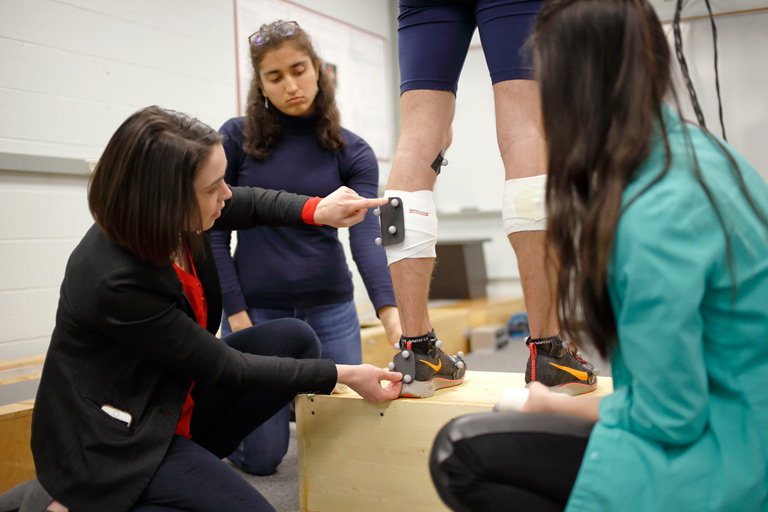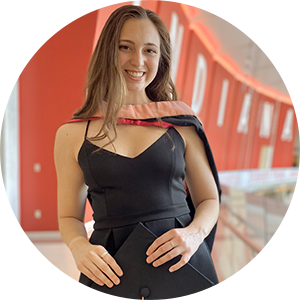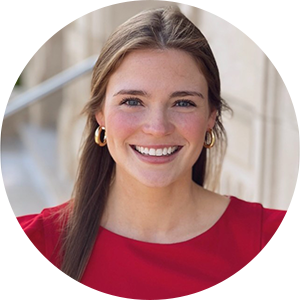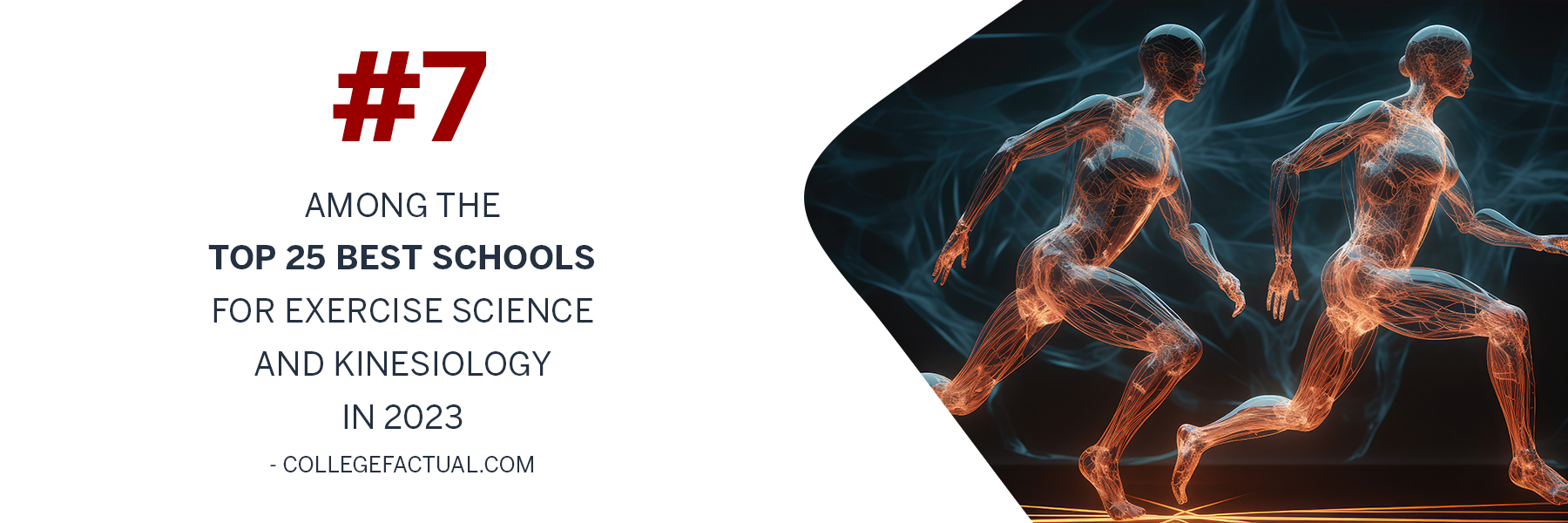 As an exercise science major, you'll learn all about topics related to human movement, including anatomy, biomechanics, exercise physiology, sport psychology, and motor learning and control. Our rigorous, science-based curriculum includes coursework, lab experiences, and research opportunities that will prepare you for a wide range of careers in health-related disciplines, including physical therapy, occupational therapy, medicine, athletic training, and research.
As an exercise science major, you'll learn all about topics related to human movement, including anatomy, biomechanics, exercise physiology, sport psychology, and motor learning and control. Our rigorous, science-based curriculum includes coursework, lab experiences, and research opportunities that will prepare you for a wide range of careers in health-related disciplines, including physical therapy, occupational therapy, medicine, athletic training, and research.
The study of human movement and sport

"The exercise science major provided a strong foundational knowledge of the body's mechanisms and functioning at various levels. I had the flexibility to explore many careers without having to change my major. I was prepared to build upon my undergraduate experience and apply it to the Master of Science in Athletic Training (MSAT) program."
Madison T. Kump, B.S. in Kinesiology – Exercise Science, M.S. in Athletic Training
Getting Started
The exercise science major explores human movement and how it impacts health and fitness. The major provides excellent preparation for students planning to further their science education at the graduate or professional level. You’ll complete foundational courses in anatomy, physiology, psychology, nutrition, chemistry, communications, and statistics. Throughout the first two years of the major, your coursework sets the stage to dive deeper into the science of human movement, understand the role of physical activity in society, and explore possible career paths in helping people live well.
First-year coursework includes:
Introduction to Kinesiology & Public Health
- Explore the intersection of human movement and public health through contemporary topics. Examples of questions considered are: Are concussions really an epidemic, and what are we doing about it? Is sitting "the new smoking?" What happens when sport becomes accessible only to those who can afford it? In addition, students explore broader issues such as environmental health, health disparities, and access.
Introduction to Exercise Science
- This course explores how the body responds to exercise and adapts to exercise over time. Students examine how the body learns new skills, controls voluntary movements, and responds to exercise in different environments. The course also discusses how exercise is a medicine that helps prevent common diseases and can help improve quality of life. Special topics in exercise physiology, biomechanics, sports medicine, and motor control are examined.
Tracks and concentrations
As an exercise science major, you’ll choose a Career Focus Area depending on your academic and career goals. Students are encouraged to discuss these four options with their academic advisors. These courses are typically completed after the first year.
Pre-Health Professions- Prepares students for graduate study in medicine
- Requires advanced coursework in biology, chemistry, and medical sciences
- Prepares students for roles in athletic training, strength and conditioning, or for graduate study in physical therapy, occupational therapy, and other allied health fields
- Requires advanced coursework in athletic training, conditioning, movement, and student-athlete psychology
- Prepares students for graduate education, careers in research, or clinical roles
- Requires advanced coursework in biology, chemistry, and physiology
- Prepares students for roles with administrative responsibilities, such as worksite wellness coordinator, operations manager, fitness director, and business owner
- Requires advanced coursework in the business side of fitness and physical activity
Upper-level coursework
Once you have completed the introductory coursework, you’ll examine specialized areas of exercise science. Coursework includes exercise physiology, biomechanics, exercise/sport psychology, and motor learning; major electives include topics such as advanced theories of strength and conditioning, fitness testing and interpretation, and adapted physical activity. You’ll also have opportunities to pursue internships or assist in research.
Working with faculty
Our diverse faculty provide a wide range of expertise in teaching, research, and experience in the field. Take advantage of office hours to talk with your instructors about your performance in class, the content of assignments, and how the course helps you work towards your professional career goals. You'll gain practical, hands-on experience by participating in the Honors Program or working with IU faculty on research projects.
Our faculty’s research interests include topics in the areas of motor control, gait biomechanics, cardiovascular and environmental physiology, traumatic brain injuries, sport psychology, and adapted physical activity. Nine laboratories are dedicated to specific research in exercise science kinesiology, including clinical neurotrauma, biomechanics, neuromuscular control, and exercise physiology. Our Bioenergetics and Environmental Stress Suite provides insights into the study of obesity and cardio-metabolic disease and is the only facility of its kind in the United States.
Commonly pursued majors, minors, and certificates
With the help of your academic advisor, you may be able to combine several areas of interest with additional majors, minors, or certificates.
The Explore Programs tool can help you find majors, minors, and certificate programs that fit you and your goals by allowing you to filter by interest area. Other majors, minors, and certificates can be excellent opportunities to build upon and broaden your interests.
Some commonly pursued minors for exercise science students include coaching, fitness instruction, healthy aging, nutrition, obesity and health, and youth development.
Additional minors and certificates in martial arts and underwater resource management are also available.
Student groups
Explore beINvolved to connect with any of the 750+ student organizations that already exist, or to start a new one. Student organizations that could fit your interest include:
- CHAARG
- Cycling Club
- InMotion Dance Company
- Physical Therapy Club
- Powerlifting Club
- Run Club
- Swim Club
- Triathlon Club
Volunteer Opportunities
Graduate programs, professional schools, and employers seek applicants who have demonstrated a long-term commitment of serving others. Gain experience serving your local community through volunteer activities. Activities that help you develop interpersonal and communication skills while working with people from a wide variety of backgrounds are especially relevant.
- Bloomington Volunteer Network
- Area 10 Agency on Aging, volunteer fitness instructor
- Bloomington Health Foundation, Hoosiers Outrun Cancer 5k volunteer
- Monroe County YMCA, special events/sport/activity volunteer
- National Multiple Sclerosis Society, Walk MS volunteer
Professional Organizations
As an exercise science major, you can get involved with professional organizations that provide additional knowledge, resources, and opportunities to become a leader in the field.
Through the major
As an exercise science major, you’ll further develop your analytical thinking, communication, and public speaking skills. You’ll gain skills in statistical analysis and experience in exercise physiology lab testing, and in-major elective courses can provide experience with fitness testing and interpretation, exercise program design, and fitness instruction.
Students who complete the exercise science major are well prepared for graduate study in exercise science, medicine, athletic training, physical therapy, and occupational therapy.
Skills desired by employers
Skills desired by employers and professional schools include a strong background in biological and social sciences, communication and interpersonal skills, clinical experience, technical ability, critical thinking, assessment, evidence-based practice, patient/client-centered care, interdisciplinary teamwork, and cultural competency.
Practicum, Fieldwork, and Internship Opportunities
Take the initiative to network and look for internship and job shadow opportunities as early as your first semester and every semester while pursuing your degree at Indiana University. Our fantastic Career Services Office supports students throughout the career search process. Common settings for internships and shadowing include physical therapy and occupational therapy outpatient clinics, fitness centers, hospitals, strength and conditioning programs, senior care centers, and autism therapy clinics.
- Athletico Physical Therapy - field observation
- Force Fitness & Performance - client coaching and instruction
- GOAL (Getting Onboard Active Living) - client education
- Indiana Law Enforcement Academy - assessments, conditioning
- IU Strength & Conditioning - assessments, conditioning, facility management
The major prepares students for a variety of interests, such as fitness, sport performance, athletic training, rehabilitation, and the medical field. Explore our Health & Human Services to learn more about career options and outcomes.
The exercise science major is an excellent match for students passionate about learning how the body works to help others live well and perform better. Students in the major are curious, analytical, and committed to making the world a better place. Introductory classes typically have 150–200 students; lab sections are 12–15 students, and the average class size is 100 in the upper-level courses.
Ready to major in exercise science? Learn more about how to join the School of Public Health-Bloomington.

"Throughout your IU career, you can get to know your professors and classmates on a personal basis, both in large and small class settings. The SPH career coaches and pre–physical therapy counselors were invaluable. These connections open several doors for you, including internal research, community involvement, and teaching assistant opportunities that allow you to stand out during the job search and graduate school application process."
Victoria Fosha, PT, DPT
Physical Therapist
Physical Rehabilitation Network


